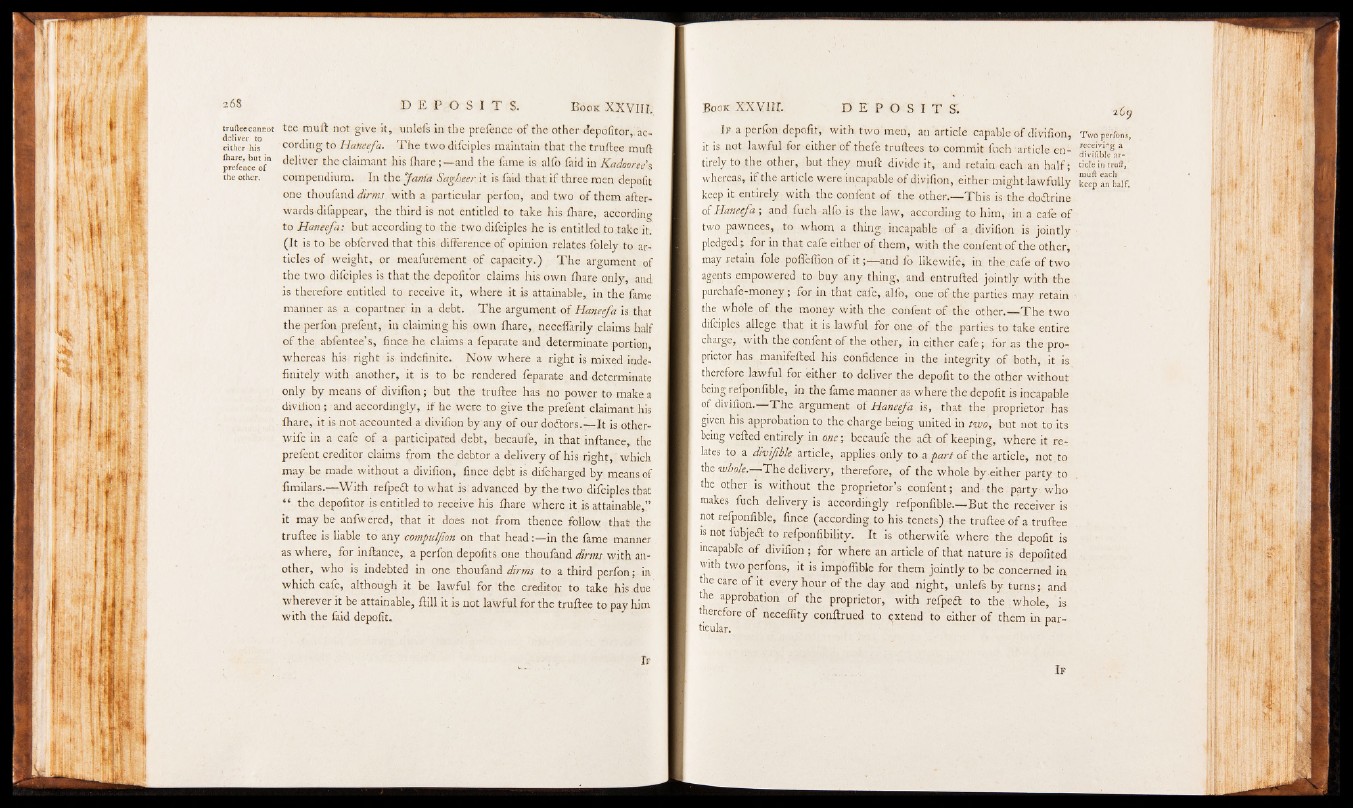
D E P O S I T S . B o o k XXVIII.
tee mull not give it, unlefs in the prefence of the other depofitor,! according
to Haneefa. The two difciples maintain that the truftee muft
deliver the claimant his (hare; — and the fame is alfo faid in Kadooree' s
compendium. In the Jama Sagheer it is faid that if three men depofit
one thoufand dirms. with a particular perfon, and two of them afterwards
difappear, the third is not entitled to take his fhare, according
to Haneefa: but according to the two difciples he is entitled to take it.
(It is to be obferved that this difference of opinion relates folely to articles
of weight, or meafurement of capacity.) T h e argument.of
the two difciples is that the depofitor claims his own fhare only, and,
is therefore entitled to receive it, where it is attainable, in the fame
mariner as a copartner in a debt. The argument of Haneefa is that
the perfon prefent, in claiming his own fhare, necefiarily claims half
of the abfentee’s, fince he claims a feparate and determinate portion,
whereas his right is- indefinite. Now where a right is mixed indefinitely
with another, it is to be rendered feparate and determinate
only by means of divifion; but the truftee has no power to make a
divifion; and accordingly, if he were to give the prefent claimant his
fhare, it is not accounted a divifion by any of our doctors.-— It is other-
wife in a cafe of a participated debt, becaufe, in that inftance, the
prefent creditor claims from the debtor a delivery of his right, which
may be made without a divifion, fince debt is difcharged by means of
limilars.— With refpedt to what is: advanced by the two difciples that
“ the depofitor is entitled to receive his fhare where it is attainable,!’
it may be anfwered, that it does not from thence follow that the
truftee is liable to any compulfion on that head:— in the fame manner
as where, for inftance,. a perfon depofits one thoufand dirms with another,
who is indebted in one thoufand dirms to a third perfon; in
which cafe, although it be lawful for the creditor to take his due
wherever it be attainable, ftill it is not lawful for the truftee to pay him
with the faid denofit.
B o o k XXVIII. D E P O S I T S
I f a perfon depofit, with t wo men, an article capable of divifion,
it is not lawful for either of thefe truftees to commit luch article entirely
to .the other, but they muft divide it, and retain each an half;
whereas, if the article were incapable of divifion, either might-lawfully
keep it entirely with the confent of the other.— This is the doftrine
of Haneefa ; and fuch alfo is the law, according to him, in a cafe of
two pawnees, to whom a thing, incapable -of a.divifion is jointly
pledged ; for in that cafe either of them, with the confent of the other,
may retain foie pofleflion of it ;— and lo like wile, in the. cafe of two
agents empowered to buy any thing, and entrufted jointly with the
purchafe-money ; for in that cafe, alio, one of the parties may retain
the, whole of. the money with the confent of the other.— T h e two
difciples allege that it is lawful for one of the parties to take entire
charge, with the confent of the other, in either cafe ; foras the proprietor
has manifefted his confidence in the integrity of both, it is
therefore lawful for either to deliver the depofit to the other without
Being refponfible, in the fame manner as where the depofit is incapable
of divifion.— T h e argument of Haneefa is, that the proprietor has
given his approbation to the charge being united in two, but not to its
being veiled entirely in one-, becaufe the adt of keeping, where it relates
to a divifible article, applies only to a part of the article, not to
the whole.—-The delivery, therefore, of the whole byeither party to
the other is without the proprietor’s confent ; and the party who
makes fuch delivery is accordingly refponfible.— But the receiver is
not refponfible, fince (according to his-tenets) the truftee o f a truftee
is not fubjeft to refponfibility. It is otherwife where the depofit is
incapable of divifion ; for where an article of that nature is depofited
with twoperfons, it is impoflible for them jointly to be concerned in
the care of ft every hour of the day and night, unlefs by turns; and
the approbation of the proprietor, with refpedt to the .whole, is
therefore of neceifity conftrued to extend to either of them in particular.
r
269
Two perfons,
receiving a
divifible article
in truft,
mu ft each
keep an half.
I f